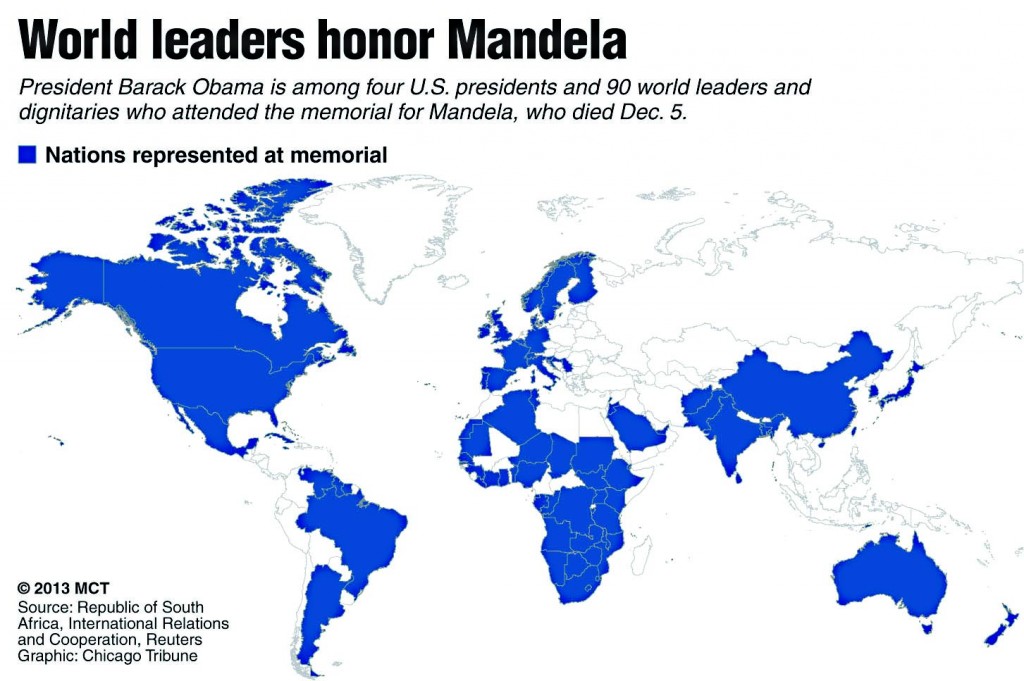Obama Hails Mandela as “Last Great Liberator”

Amid cheers and song for the prisoner who became peacemaker, President Barack Obama energized tens of thousands of spectators and nearly 100 visiting heads of state Tuesday with a plea for the world to emulate Nelson Mandela, “the last great liberator of the 20th century.”
Obama’s eulogy was the rhetorical highlight of a memorial service in which South Africans celebrated Mandela’s life with singing and dancing, often during dignitaries’ speeches. They also booed their own president and were chided by a top government official who said: “Let’s not embarrass ourselves.”
Lashing rain lent a freewheeling aspect to the memorial, with people taking shelter in the stadium’s wide hallways, where they sang anti-apartheid anthems from the 1970s and 1980s. Foul weather kept many away, and the 95,000-capacity stadium was only two-thirds full.
Obama implored people to embrace Mandela’s universal message of peace and justice, comparing the South African leader to Mahatma Gandhi, Martin Luther King Jr. and Abraham Lincoln. Mandela spent 27 years in prison under a racist regime, and promoted forgiveness and reconciliation when he was finally freed.
 “We will never see the likes of Nelson Mandela again,” Obama said. “But let me say to the young people of Africa, and young people around the world — you can make his life’s work your own.”
“We will never see the likes of Nelson Mandela again,” Obama said. “But let me say to the young people of Africa, and young people around the world — you can make his life’s work your own.”
He hailed Mandela, who died Thursday at 95, as the unlikely leader of a movement that gave “potent voice to the claims of the oppressed and the moral necessity of racial justice.”
“Born during World War I, far from the corridors of power, a boy raised herding cattle and tutored by the elders of his Thembu tribe, Madiba [Mandela’s clan name] would emerge as the last great liberator of the 20th century,” Obama said.
Obama, who, like Mandela, became the first black president of his country, said he was inspired by Mandela as a student. The speech was greeted with thunderous applause, and many heads of state and other foreign dignitaries gave Obama a standing ovation.

Obama pointed out that “…around the world today, men and women are still imprisoned for their political beliefs, and are still persecuted for what they look like, or how they worship…”
On the way to the podium, Obama shook hands with Cuban President Raul Castro, underscoring a recent warming of relations between their countries. Other attending leaders criticized for their human rights records were Zimbabwe’s Robert Mugabe, Equatorial Guinea’s Teodoro Obiang Nguema and Gambia’s Yahya Jammeh.
In contrast to the wild applause given to Obama, South African President Jacob Zuma was booed. Many South Africans are unhappy with Zuma because of state corruption scandals.
Mandela’s record after he was elected in the first all-race elections in 1994 has faced some criticism, most of it indirect because he was such a revered figure.

He did not push for major restructuring of the economy, not wanting to alienate whites who still control most of South African industry. The country still struggles with economic inequality.
After Tuesday’s memorial, Mandela’s body will lie in state for three days at the Union Buildings in Pretoria, once the seat of white power, before burial Sunday in his rural childhood village of Qunu in Eastern Cape Province.
This article appeared in print on page 7 of edition of Hamodia.
To Read The Full Story
Are you already a subscriber?
Click "Sign In" to log in!

Become a Web Subscriber
Click “Subscribe” below to begin the process of becoming a new subscriber.

Become a Print + Web Subscriber
Click “Subscribe” below to begin the process of becoming a new subscriber.

Renew Print + Web Subscription
Click “Renew Subscription” below to begin the process of renewing your subscription.











